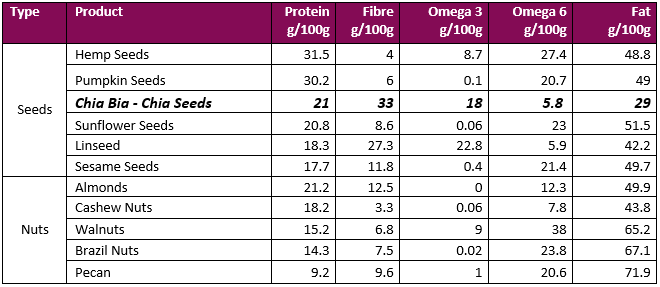Omega 3
Omega 3 is an essential fatty acid that the body needs but cannot produce therefore we need to eat sources of it or take Omega 3 supplements.
Fats – Are they good or are they bad for us?? Frequently the topic of nutrition discussions and one that has caused confusion amongst people for years. Fats are actually essential for good health and should make up 30-35% of our daily calorie intake.1 Fats are required for many bodily functions including brain and hormone function, absorption of fat-soluble vitamins, heart health, insulation and energy.
Fats are made up of fatty acids and they fall into three main categories; saturated, unsaturated and hydrogenated. Hydrogenated or trans fats are considered to increase disease risk, even when eaten in small quantities. Previously they would have been in processed foods but fortunately, trans fats have been eliminated from many of these foods now. Saturated fatty acids tend to be hard at room temperature and are found in animal products, palm and coconut oil. These are the fats that if taken in excess can contribute to raising cholesterol in the blood, which is why they are often called the ‘bad fats’. It is advised to reduce saturated fats in their diets but not eliminate them…they should make up <10% of our calorie intake.2
Unsaturated fats are made up of monounsaturated fatty acids (MUFA) and polyunsaturated fatty acids (PUFA). These are often referred to as the ‘good fats’. Unsaturated fatty acids are known to help reduce blood cholesterol and are found in some vegetables oils, olive oil, chia seeds, nuts, avocados, olives and fish. One of the best ways to help prevent and treat heart disease is to eat a diet that is low in saturated and rich in monounsaturated and polyunsaturated fats.
About a third of our overall dietary fat should come from polyunsaturated fats, which include omega-3 and omega-6 fatty acids. Omega-3 fatty acids in particular are a key part of the PUFA family. They have been shown to help prevent heart disease and stroke and may play a protective role in in preventing cancers.3 There are three main forms of Omega 3 fatty acids that we should take note of;
Eicosapentaenoic (EPA) found in oily fish
Docosahexaenoic (DHA) found in oily fish and
Alpha-linolenic acid (ALA) comes from plant sources.
Plant omega 3 (ALA) has been shown to be particularly effective in heart health, mainly the maintenance of normal blood pressure and cholesterol levels.4 Research showed that diets rich in plant omega 3 have lower incidence of deaths related to heart disease, particularly when coupled with a Mediterranean style diet.5 One study found that 2.6g of plant omega 3 (ALA) per day over a 12-week period helped lower blood pressure, 2.6g of ALA can be found in 15g of chia seeds or 30g of walnuts.6 Another found that that women who ate a diet rich in plant omega 3 (1.5 g of ALA per day) had a 46% lower risk of heart disease.5
Two of the fatty acids in the PUFA family are considered essential; linoleic acid (omega-6) and alpha linolenic acid (ALA or plant omega-3). We need these two fatty acids to function properly but cannot make them so we must get them from food.7 When we consume ALA our body is able to convert it into EPA and DHA. Plant omega 3 (ALA) is found in rapeseed oil, dark green vegetables, nuts and seeds with chia seeds being particularly high source. Plant omega 3 is often overlooked as a valuable source of omega 3 but shouldn’t as it does play an important role in the diet.
What we do need to consider when it comes to these essential fats is the ratio of omega-6 to omega-3 in our diets. Omega-6 fatty acids are pro-inflammatory, while Omega-3 acids have an anti-inflammatory effect. We need both factors…inflammation is essential as it helps protect our bodies from infection and injury however too much can lead to disease. Omega-3 fatty acids are anti-inflammatory and they can help balance inflammation in the body. A typical Western style diet contains much more omega-6 than omega-3 so the balance is off. This imbalance has been considered one of the reasons for the increase of heart disease over the last 20 years. In the body, LA (omega-6) and ALA (plant omega-3) actually compete with each other for metabolism. So previously it was suggested that we should consume aim to consume these fats in a ratio of 1:1. Whereas now the advise is simple…to optimise the amount of omega-3 fatty acids in our tissues we simply need to increase the amount of omega-3 from ALA, EPA and DHA in the diet!3
Recommended intakes of plant omega-3 (ALA) vary from 0.5% (European Safety Authority) to 2% (WHO) of energy to Germany that suggests 1.8-2g per day. What can be agreed is that intakes are too low in most cases and increasing our consumption of omega-3 rich foods would be beneficial to most diets.
How to boost my intake of omega-3 fatty acids
Include oily fish in the diet twice a week
Replace sunflower oil with rapeseed oil
Add chia seeds to yogurt, cereal, salad or smoothie
Eat something green everyday…add spinach or kale to your weekly diet.
Add some nuts to your salad or have as a snack. Walnuts are a particularly good source
Include some soya or soya products in the diet.
And you can always look for enriched foods like eggs high in omega-3, spreads, and milks!
Fibre
Chia is the highest source of fibre of all nuts and seeds, containing an average of 20% more fibre than flax seed. Fibre is a part of food that cannot be digested and contains no calories. It passes through the body unabsorbed and helps the body eliminate waste. However it appears that almost 80% of Irish adults do not eat enough fibre. Chia seed is naturally high in fibre and is a great way to boost the fibre content in foods.
Protein
Chia is a great source of protein containing all 9 essential amino acids and as much protein as almonds and cashews and at least 30% more protein than walnuts, brazil nuts and pecans.
The table below compares the level of nutrients in chia with other common nuts and seeds.
References
- www.efsa.europa.eu
- Facts on Fats – Dietary Fats and Health. www.eufic.org
- The-importance-of-omega-3-and-omega-6-fatty-acids. www.eufic.org
- http://ec.europa.eu/nuhclaims
- Mediterranean alpha-linolenic acid-rich diet in secondary prevention of coronary heart disease. Volume 343, Issue 8911, 11 June 1994, Pages 1454-1459. M de Lorgeril, et al.
- Antihypertensive effect and safety of dietary alpha-linolenic acid in subjects with high-normal blood pressure and mild hypertension. J Oleo Sci. 2007;56(7):347-60. Takeuchi H et al
- Scientific Recommendations for Healthy Eating Guidelines in Ireland, 2011 food safety authority of Ireland
- Alpha-linolenic acid, 2014, Steven D. Ehrlich, NMD, www.uum.edu


 No products in the cart.
No products in the cart.